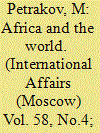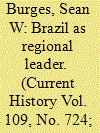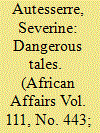| Srl | Item |
| 1 |
ID:
117369


|
|
|
|
|
| Publication |
2012.
|
| Summary/Abstract |
FOR MANY DECADES, Africa was and still largely is a continent "full of problems." The problems of resolving existing conflicts and preventing new ones, and eradicating poverty, disease, social inequality, and illiteracy have always been especially acute in the African agenda. By no means all of them are resolved, or resolved to completion. But recent signs from the African South bear witness to an optimistic and ambitious vision for its future. RSA as the most economically developed country in Africa, projecting itself as a regional leader, generates political impulses aimed at strengthening Africa's overall position in the world, promoting regional integration and consolidating African identity as such.
|
|
|
|
|
|
|
|
|
|
|
|
|
|
|
|
| 2 |
ID:
093667


|
|
|
|
|
| Publication |
2010.
|
| Summary/Abstract |
Lula has regarded regional involvement as a means to strengthen Brazilian industry for global competition and to establish his country as a credible actor on the world stage.
|
|
|
|
|
|
|
|
|
|
|
|
|
|
|
|
| 3 |
ID:
112124


|
|
|
|
|
| Publication |
2012.
|
| Summary/Abstract |
Explanations for the persistence of violence in the eastern part of the Democratic Republic of Congo blame the incendiary actions of domestic and regional leaders, as well as the inefficacy of international peace-building efforts. Based on several years of ethnographic research, this article adds another piece to the puzzle, emphasizing the perverse consequences of well-meaning international efforts. I argue that three narratives dominate the public discourse on Congo and eclipse the numerous alternative framings of the situation. These narratives focus on a primary cause of violence, illegal exploitation of mineral resources; a main consequence, sexual abuse of women and girls; and a central solution, extending state authority. I elucidate why simple narratives are necessary for policy makers, journalists, advocacy groups, and practitioners on the ground, especially those involved in the Congo. I then consider each narrative in turn and explain how they achieved prominence: they provided straightforward explanations for the violence, suggested feasible solutions to it, and resonated with foreign audiences. I demonstrate that the focus on these narratives and on the solutions they recommended has led to results that clash with their intended purposes, notably an increase in human rights violations.
|
|
|
|
|
|
|
|
|
|
|
|
|
|
|
|
| 4 |
ID:
149699


|
|
|
|
|
| Summary/Abstract |
Burundi's president Pierre Nkurunziza has succeeded in remaining in office for a third, unconstitutional term despite domestic opposition and regional opprobrium. Will Jones examines the implications for regional stability and security of Burundi's election.
|
|
|
|
|
|
|
|
|
|
|
|
|
|
|
|
| 5 |
ID:
120684


|
|
|
|
|
| Publication |
2013.
|
| Summary/Abstract |
This study examines the support for United Russia in 43 regional assembly elections which were conducted over the period from March 2008 to March 2011. In contrast to previous studies, which have tended to focus on the overall results of regional elections or just on the party-list votes, it provides a quantitative analysis of the votes for United Russia in the plural single member district contests. By widening the traditional focus on the aggregate results and party-list voting the study brings to light important variations in the patterns of United Russia's electoral domination of regional assemblies. The specific form of United Russia's domination depends on the configuration of regional elites and their strategies. Social and economic features of the regions have little impact on the degree and modes of United Russia's electoral domination, but influence the ability of regional leaders to ensure electoral mobilisation in the regions and this is more significant the higher the level of the election.
|
|
|
|
|
|
|
|
|
|
|
|
|
|
|
|